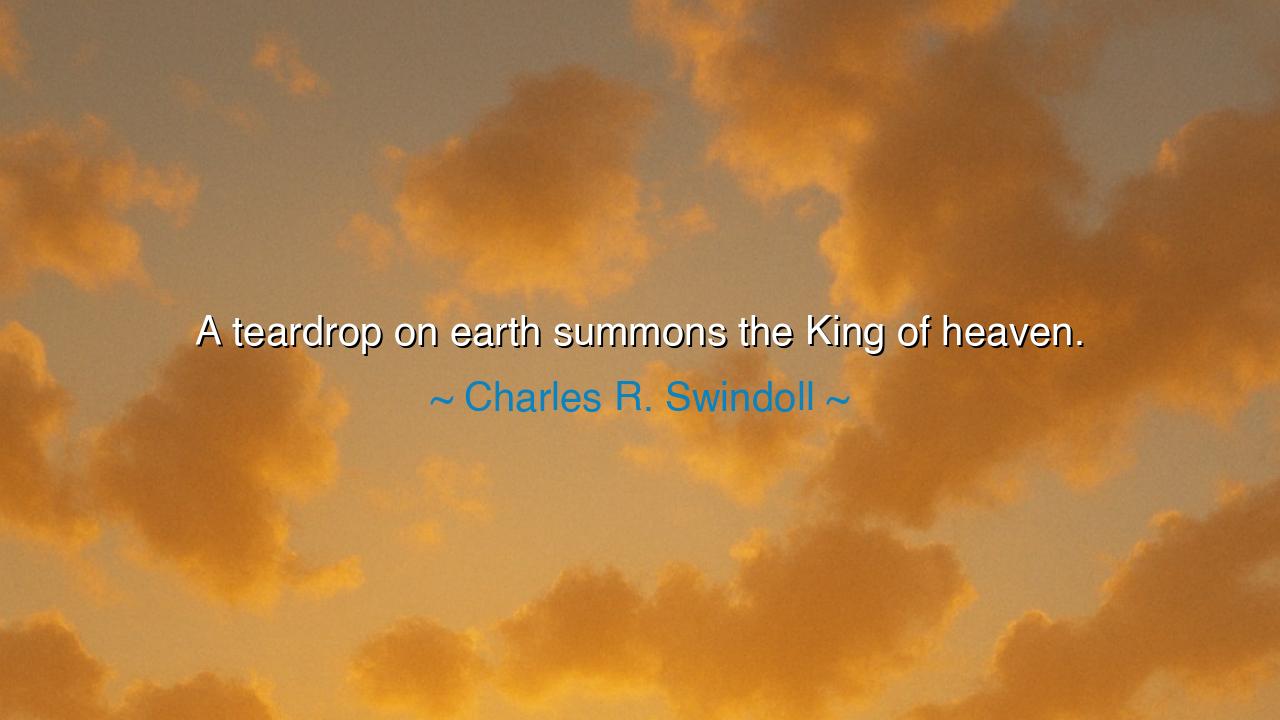
A teardrop on earth summons the King of heaven.






The wise and tender-hearted Charles R. Swindoll, a teacher of faith and the quiet workings of grace, once said: “A teardrop on earth summons the King of heaven.” These words, simple yet resplendent, hold within them the mystery of divine compassion—the truth that no sorrow is unseen, and that every tear is a prayer reaching beyond the clouds. In them, Swindoll teaches what the ancients knew but the hurried forget: that heaven is not distant, nor deaf to pain. When the heart breaks open and releases its tears, those drops become summonses of the soul, calling the eternal toward the mortal, the Creator toward His creation.
The origin of this quote lies in the deep current of the Christian faith and the timeless wisdom of Scripture, where tears have always been regarded as sacred offerings. The Psalmist once wrote, “You have kept count of my tossings; put my tears in your bottle; are they not in your record?” (Psalm 56:8). Swindoll, in the spirit of this verse, reminds us that no grief is wasted, no anguish ignored. A teardrop, to him, is not weakness—it is a signal of truth, a confession of human limitation, and an act of faith that Heaven will listen. Thus, the smallest tear shed in pain or prayer becomes a summons—a royal call that reaches the King of Heaven, who answers not with thunder, but with mercy.
Throughout the ages, there have been moments when tears became the very bridge between despair and deliverance. Think of Hannah, the mother of Samuel, who wept bitterly before the temple of God because her arms were empty of the child her heart longed for. Her tears were not lost upon the earth; they rose as incense before the throne of the Almighty. And from those tears came a prophet who would anoint kings. So too, in our own lives, the tears we shed in hidden rooms are not forgotten. Heaven bends low to the trembling of the human heart. Each sorrow becomes a silent conversation between the finite and the infinite, between a soul in pain and the God who hears.
To weep, then, is not to surrender to despair but to step into divine intimacy. The proud heart that cannot cry is a heart that shuts its door to healing. But the one who allows their tears to fall acknowledges a truth that the proud cannot bear—that we are fragile, dependent, and in need of something greater than ourselves. This is why Swindoll’s words carry both power and comfort: they remind us that the moment we allow ourselves to feel, Heaven itself begins to move. A teardrop, though born of sorrow, becomes an instrument of grace.
Consider also the story of Abraham Lincoln, who, in the depths of the Civil War, was seen weeping in solitude. His tears were not for himself, but for the suffering of a nation. Those who witnessed it said that his sorrow seemed to sanctify his resolve. In his weeping, he did not weaken—he connected his human heart to a divine purpose. This is the secret Swindoll unveils: that tears are not the end of strength, but its beginning. They call forth the compassion of Heaven, and through that compassion, the courage to rise again.
The lesson is eternal and clear: never despise your tears. They are not symbols of defeat, but messengers of hope. When your spirit aches and words fail you, let your heart speak in tears, for they ascend faster than speech. They carry your truth where logic cannot go, and summon not judgment but mercy. The King of Heaven—the God of comfort—answers not the proud demand but the humble cry.
Therefore, my child, when sorrow presses upon your soul and the night feels endless, remember this: your tears are seen. They fall not into emptiness but into the hands of the divine. Do not hide them. Let them water the soil of your faith, for from that soil will grow compassion, strength, and peace. And when you rise again, cleansed by your own weeping, you will know that you have not wept in vain.
So take heart, for as Charles R. Swindoll proclaimed, “A teardrop on earth summons the King of heaven.” Your pain has power. Your sorrow is sacred. And when you cry, Heaven does not turn away—it draws near. For the sound of a weeping heart is the sweetest call the divine can hear.






AAdministratorAdministrator
Welcome, honored guests. Please leave a comment, we will respond soon